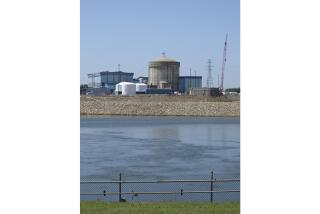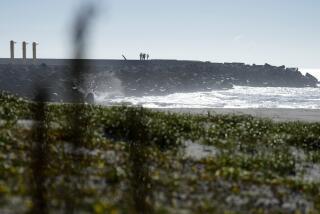Steam Kills 4 at Japanese Nuclear Plant
- Share via
TOKYO — High-pressure steam bursting from a ruptured pipe in a Japanese nuclear reactor burned four workers to death Monday, sending ripples of alarm through a country that is heavily dependent on nuclear power.
Officials said the steam was not radioactive and posed no threat of contamination to people in the nearby town of Mihama on the Sea of Japan, 40 miles north of Kyoto.
But Kansei Electric Power Co., which runs the facility, acknowledged today that it had failed to conduct safety checks that would have indicated the pipe had corroded far below the minimum standard thickness.
“We conducted visual inspections but never made ultrasonic tests which can measure the thickness,” company spokesman Haruo Nakano said.
The tragedy and the revelations of lax safety inspections are sure to have psychological fallout in a country where many people are deeply uneasy about the safety of nuclear power, yet which relies on such facilities to satisfy more than one-third of its voracious energy appetite.
Seven other workers were injured in the accident, two of them seriously, by vapor that may have been as hot as 390 degrees.
The blast hit the men as they prepared for the 28-year-old reactor’s annual inspection, due to begin Saturday.
Officials said the leak may have started at a crack or hole in a 19-inch pipe used to circulate steam that drives the generators that produce electricity. The reactor was shut down pending an investigation, but two others at the plant were still operating.
The company’s confession of lax inspections renewed doubts about the commitment to safety in an industry with a history of trying to hide its troubles.
Last year, Tokyo Electric Power confessed to having covered up reports on technical failures at its 17 power plants, including cracks in some of the reactor structures. Nor was this the first sign of trouble at the Mihama facility, owned by Kansai Electric. In 1991, radioactive water leaked from a ruptured tube in another of Mihama’s three reactors. No one was injured.
In 1999, two employees at the Tokaimura reprocessing plant 80 miles northeast of Tokyo died after a radiation leak caused by their mishandling of uranium. Local residents were evacuated after that accident, when about 600 people were exposed to low levels of radiation.
That safety record has made many Japanese wary of government plans to expand the nation’s nuclear capacity, which, with 52 plants, is already greater than any country except the United States and France.
But industry officials warned against overreacting to Monday’s fatalities. They argue that Japan must increase the proportion of nuclear power to wean itself from an overreliance on oil.
Japan imports more than 80% of its energy, a situation that many economists warn is dangerous given political volatility in the Middle East and the recent jump in crude oil prices.
More to Read
Sign up for Essential California
The most important California stories and recommendations in your inbox every morning.
You may occasionally receive promotional content from the Los Angeles Times.













